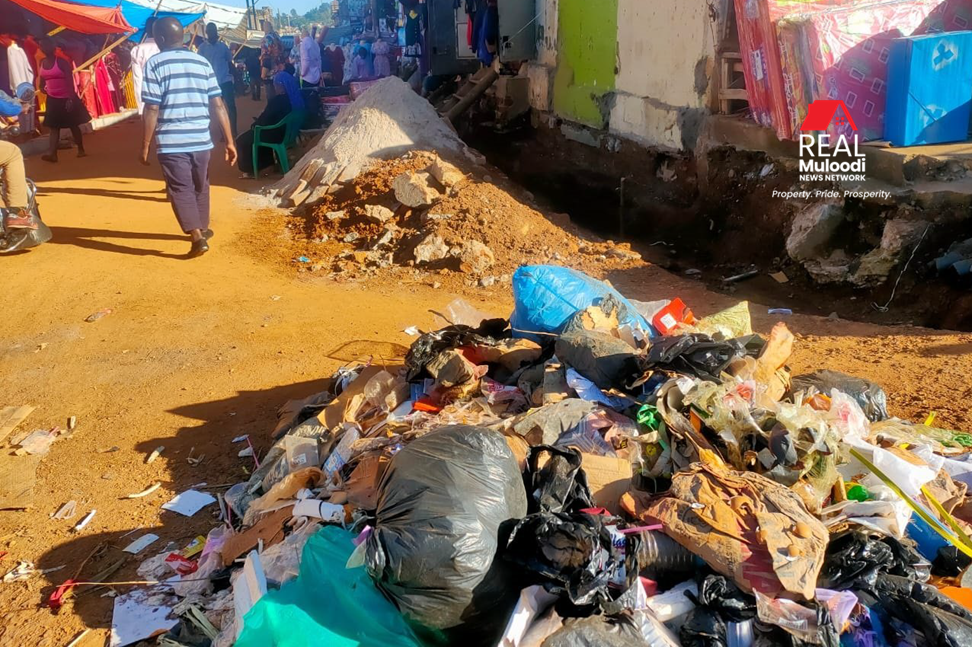UGANDA, Masaka | Real Muloodi News | Residents and traders in Masaka City are raising concerns over the garbage fees charged by private firms managing solid waste.
Although a standard fee of USh200 per kilogram of garbage was initially set, residents allege they are being charged higher amounts by the firm’s Youth in Action Masaka City (YAMAC) and Tusekimu Masaka City Association (TUMCAS).
Ms Shamimu Nakawooya, the proprietor of Shamuwat Traders on Edward Avenue, expressed her frustration, stating, “Although charging money based on the weight of garbage is unfair, the same is true with the current system where payment depends on the size of the container of waste collected.”
Nakawooya said she spends at least USh10,000 every month on garbage collection, which she finds unreasonable for a grocery shop.
“It’s unbelievable that a grocery shop like mine has to pay USh10,000. How much garbage do I generate? I am not running a restaurant; it is such places that generate a lot of solid waste,” she added.
Ms. Jane Francis Namubiru, a restaurant owner on Elgin Street, reported spending more than USh20,000 monthly on garbage collection. She noted that the initially set fee of USh200 per kilogram was fair.
“When the council set USh200 for each kilogram of garbage, the fee was fair,” Namubiru said.
However, Mr Muhammad Nsibambi, one of the proprietors of YAMAC, explained that the change in the fee structure was to avoid overcharging clients.
“We introduced a new system of charging based on the size of the container/bag instead of weighing it in kilograms because we found out that we could end up overcharging our clients,” Nsibambi said.
He clarified that shops and households generating garbage need to pay USh10,000, though some shops pay USh5,000 for the four times garbage is collected in a month, while restaurants and hotels pay between USh10,000 and USh20,000 depending on the garbage generated.
“There are some people who pay between USh1,000 and USh2,000 every time we collect garbage,” he added.
Masaka City health inspector Musa Maberi emphasised that the law sets a fee of USh200 per kilogram of garbage but allows for negotiation with the firms for city dwellers generating bulk waste.
“I advise those who feel cheated to reduce the garbage they generate by avoiding materials like plastic bags,” Maberi said.
Masaka City authorities can collect only 70 per cent of the garbage, leaving 30 per cent uncollected. Last year, the city generated at least 24,000 tonnes of garbage. The city’s population has doubled in the last decade, from 79,000 to 251,000.
The private firms YAMAC and TUMCAS were allegedly contracted by Masaka City to manage solid waste. The initial agreement stipulated that residents would be charged UShs200 per kilogram of garbage collected. This fee structure was intended to ensure fairness and transparency in waste management.
Mr Muhammad Nsibambi of YAMAC explained that the change in the fee structure was necessary to avoid overcharging clients.
He stated that charging based on the size of the container or bag instead of the weight was a more practical approach.
According to Nsibambi, shops and households generating garbage need to pay USh10,000, with some shops paying USh5,000 for four collections per month.
Restaurants and hotels are charged between USh10,000 and USh20,000, depending on the amount of garbage generated. Nsibambi also noted that some residents pay between USh1,000 and USh2,000 per collection.
Masaka City health inspector Musa Maberi highlighted that the law sets a fee of USh200 per kilogram of garbage but allows for negotiation with the firms for city dwellers generating bulk waste.
Maberi advised residents to reduce the amount of garbage they generate by avoiding materials like plastic bags.
Masaka City authorities face challenges in collecting all the garbage generated. Currently, only 70 per cent of the garbage is collected, leaving 30 per cent uncollected.
Last year, the city generated at least 24,000 tonnes of garbage. The city’s population has doubled in the last decade, increasing from 79,000 to 251,000, which has put additional pressure on waste management systems.
The fee structure for garbage collection in Masaka City is governed by regulations that set a standard charge of USh200 per kilogram.
However, negotiations are flexible, particularly for residents and traders generating larger amounts of waste. The objective is to ensure a fair and manageable system for waste collection and disposal.
The new fee structure has allegedly had a significant impact on businesses in Masaka City. Traders and shop owners have reported increased expenses due to the higher charges for garbage collection. This has added to their operational costs and affected their profitability. The situation has led to calls for a review of the fee structure to ensure it is fair and manageable for all parties involved.
In response to the concerns raised by residents and traders, Masaka City authorities are exploring options to address the issues. This includes engaging with private firms to review the fee structure and ensure it aligns with the initial agreement of USh200 per kilogram.
Additionally, efforts are being made to improve waste management systems and increase the efficiency of garbage collection.
READ MORE LIKE THIS:



